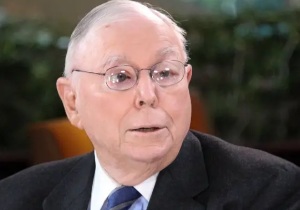
While The Washington Post called Munger Buffett's “sidekick,” The economist's headline said he was much more than that, “a paragon of common sense,” while The Financial Times said he “offers lessons in creating meaningful wealth.”
The Wall Street Journal said he was “Robin to Warren Buffett's Batman, a business equivalent of the Edge rocking with the Bono of investing.”
Tributes have been flowing throughout the US, in Britain, as well as in China and here at home in New Zealand and none more so than at Fisher Funds, a funds management business founded on similar buy and hold investment principles that Munger espoused.
Munger claimed the big money was not in trading but in buying quality stocks and waiting.
Robbie Urquhart, portfolio manager at Fisher Funds, says it was Munger who shifted Buffett's focus from buying cheap stocks of underperforming companies to buying good quality companies and that it was Munger's pick of buying See's Candy from the See family in 1972 that convinced Buffett of Munger's wisdom.
Bought for US$25 million, by the end of 2022, See's had earned more than US$2 billion for Berkshire Hathaway, according to Business Insider.
“Warren wasn't comfortable with the price because they were effectively buying a brand, but it became a light-bulb moment for Buffett,” Urquhart says.
Munger had “a titanic” influence on Buffett and Berkshire Hathaway has lost part of its conscience with Munger's passing, he says.
But it wasn't just in business that Munger set a fine example – Urquhart points to the tragedies in his life, including losing a son at nine years old to leukemia.
“He lived life to the full and approached adversity, trials and tribulations with stoicism and his feet firmly on the ground.”
Urquhart notes that Munger also busied himself with social causes, particularly a woman's right to choose by backing the case of Dr. Leon Belous when he was convicted in 1967 of performing an illegal abortion.
The case was appealed all the way to the Supreme Court, which found the California law Belous was convicted under was unconstitutional, paving the way for the famous Roe vs Wade decision which kept abortion legal until June last year when another Supreme Court bench overturned it.
Urquhart says Munger had witnessed everything from the Great Depression to World War ll and had seen many, many business cycles and continue to learn from each one and, “because he was a learning machine, he would factor all that in.
“He didn't want to do brilliant things, he just wanted to avoid doing stupid things.”
But Munger had an impact even on those who weren't fans.
Harbour Asset Management managing director Andrew Bascand says he probably isn't a fan, “but I could yet become one.”
Because to be a Munger fan, “you have to like his passion for not believing in diversification. I expect Munger hated passive investing,” Bascand says.
Harbour does use index-tracking as part of its investment offering.
“I am a fan of deep equity research, patience in investing, the value of compounding when it comes to dividends and acknowledging where you expertise lies and acknowledging where your expertise lies and when you have no additional insights compared to the market.”
But he does have a favourite Munger quote: “Without the method of learning, you're a one-legged man in an ass-kick contest. It's just not going to work very well."




Comments
No comments yet.
Sign In to add your comment